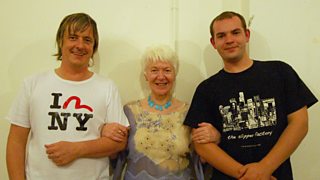Why a 20 minute rest could help you work better
One fitness expert believes modern life is leaving us 'wired and tired' and the solution is for us to begin 'intermittent resting'.
Fitness expert Nahid de Belgeonne began to notice similarities among the clients attending her classes. They were all fit and busy people, and they were worn out.
"They were mentally wired and tired," explained Nahid on Mornings. "They were pushing themselves beyond their capabilities, buoying themselves up with pints of coffee and going to bed and not being able to sleep because they were so jittered."

The benefits of intermittent resting
Nahid de Belgeonne on taking a break to boost productivity
Nahid realised her clients needed to learn how to slow down, and this prompted her to devise a system she calls intermittent resting.
She explains, "At night you have a 90-100 minute cycle of REM where lots of processing and housekeeping happens. Your brain’s cleaned, your body's cleaned up, waste's gotten rid of. And then that's followed by about 20 minutes of very deep sleep which is where you repair, and that's really nutritious."
Nahid has introduced this pattern into her daytime activity.
"I work in intense bouts of 90-120 minutes on one task and then I have a bit of a break for about 15-20 minutes where I’ll do something mindless."
She believes that we should all follow her lead by taking a break from our screens and intense brain activity at work. This can be done by taking moving to a quieter room, walking to a colleague's desk for a chat, or even volunteering to do the coffee run.
While it might be a tricky routine to get into, Nahid believes that a short period of downtime during the day can only be a good thing and will ultimately benefit businesses.
"You'll end up seeing a much more productive, creative, agile workforce," she says.
On ����ý Sounds
-
![]()
Mornings
Kaye Adams gets to the heart of stories making the news.
Latest features from ����ý Scotland
-
![]()
'Wild swimming helps me process the grief of losing my son'
The benefits of cold water therapy.
-
![]()
Winter adventures are appealing, but an expert advises caution
Trips in winter require particular knowledge and skills.
-
![]()
The rescuers: Why volunteers risk their lives in mountain emergencies
Landward meets members of the Cairngorm Mountain Rescue Team.
-
![]()
‘Look for the light’ – practical tips to help you through another winter with SAD
Useful advice and tips to combat low moods at this time of year.
-
![]()
How you could be a binge drinker without even knowing
Binge drinking is classed as fewer units than many people may realise.
-
![]()
How chocolate biscuits and drama classes helped one man leave prison behind
The healing power of creativity.
-
![]()
'When people believe in you, it’s life-changing'
Author Graeme Armstrong revisits the man who helped turn his life around.
-
![]()
The 'breath-taking' display of US birds swept on to British soil
Recent storms have brought rare birds to our shores.
-
![]()
Six things we learned about Alan Cumming on Take the Floor (Spoiler: includes accordions)
The actor spoke to Take the Floor's Gary Innes.
-
![]()
How street gangs trap young men in a dangerous cycle of violence
The almost inescapable pull of life in a gang.
-
![]()
Why stylist Gok Wan believes there's no such thing as bad fashion
The fashion expert says we should stop following rules and do what feels right.
-
![]()
Is sending a CV still the right way to apply for a job?
They've been central to job applications for years, but are they worth it?
















